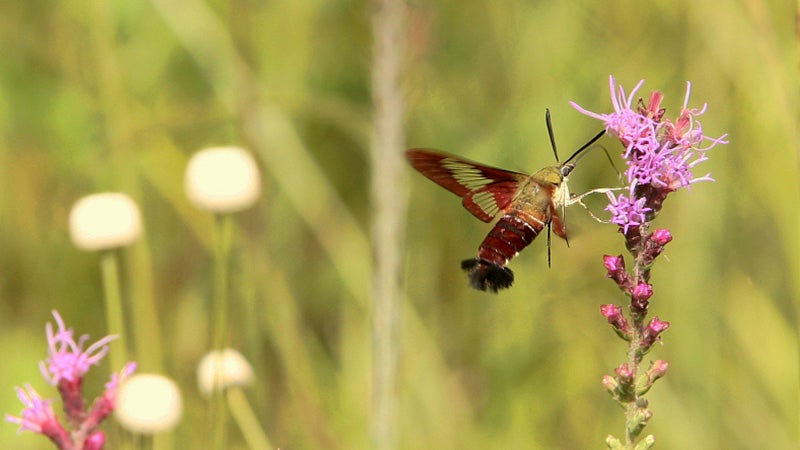Gardening for butterflies and other pollinators
Published 7:00 am Wednesday, April 24, 2019

- Hummingbird moths feed on nectar-rich flowers such as this Liatris (Blazing Star) flower. It got its name due to the resemblance to a hummingbird. Submitted photo
By Patricia R. Drackett, Director and Assistant Extension Professor of Landscape Architecture
The Crosby Arboretum, Mississippi State University Extension Service
Last week, Arboretum Paths focused on monarchs and milkweed, and as I’m writing this I can almost hear the monarch caterpillars munching happily away nearby in the Arboretum’s pollinator garden. Several times this past week, I stopped by the garden and relocated some of the fat and hungry caterpillars from the ends of bare milkweed trunks, to plants that still have leaves.
From what we’ve been hearing, the area is continuing to explode with a bumper crop of monarch caterpillars. Consequently, there are many concerned gardeners out there hoping their plants will be enough to satisfy their appetites. The larval stage of these insects lasts approximately two weeks, and during this time they pass through five growth stages, called “instars”.
Should you find yourself without milkweed to offer your mature monarch caterpillars, they have been known to eat pumpkin, butternut squash, zucchini and interestingly, cucumbers. However, this is only during their last few days of being in the caterpillar stage. You can find lots of images of monarch caterpillars “eating their veggies” and information on the subject in an Internet search.
If you’re finding tiny caterpillars on your plants, hold on for the ride! You’ll find butterflies cavorting about your garden in about a month. But when they do, will they find the necessary food in your garden to sustain them?
Flowering plants that produce plenty of nectar are what your butterflies will be searching for once they emerge from their chrysalis.
Many plants that attract bees, butterflies, and other pollinators can be found at our Pollinator Plant Sale on May 31 and June 1. Native perennials such as Stokes’ aster, Liatris, blanket flower (Gaillardia) bee balm (Monarda) black-eyed Susan, and purple coneflower (Echinacea) are also great nectar producers. And although they tend to be thought of as host plants, milkweeds are heavy nectar producers, and also useful to pollinating insects.
Surprisingly, one plant that useful to humans as well as to bees and other pollinators is basil. Many varieties are available, and all smell delicious! Late in the summer, our basil plants as well as our Salvia are visited constantly by bees and other pollinators, and sometimes by unusual insects such as hummingbird moths.
For an information on plants to attract Mississippi butterflies, visit the MSU Extension website at http://extension.msstate.edu/. Select “Publications” in the menu bar and enter “butterflies” in the search field to download Publication Number IS1661, “Butterfly Plants & Mississippi Butterflies”. Another pertinent publication is “Gardening for Beneficial Bees in Mississippi” (Pub. No. 2976), which provides a wealth of information on designing gardens to attract these pollinating insects.
A Native Plant Field Walk will be held on Saturday, May 4, from 10:00 to 11:00 a.m. Join Arboretum director Pat Drackett to explore native plants in the Arboretum exhibits. Bring your camera and dress for walking. Members free; non-members $5.
A Children’s Nature Craft Workshop will be held the afternoon of May 4, from 1:00 to 2:00 p.m. There is no minimum age requirement, as children must be accompanied by an adult. Members’ children $4; non-members’ children $6; no charge for adults.
In “Landscaping with Wildflowers”, on Saturday, May 11 from 10:00 to 11:00 a.m., learn how to plan and establish these low-maintenance species, suited to your site’s specific conditions with Pearl River County Extension Agent, Dr. Eddie Smith. Cost is $3 for members and $5 for non-members. Dr. Smith will then present “Square Foot Gardening” following the wildflower program, from 11:00 to Noon. Would you like to grow your own vegetables, but don’t think you have the space, time, or energy? Learn just how easy and fun this method of gardening can be. Program is $3 for members and $5 for non-members.
In the afternoon of Saturday, May 11, enjoy “Yoga on the Pinecote Pavilion” from 1:00 to 2:00 p.m. with certified yoga instructor James Sones for a gentle yoga class and short meditation sitting. Yoga mats will be provided, or bring your own. Please arrive 10 minutes early. Members free, non-members $5.
That evening, enjoy “Music Under the Pines” an open mic event, from 6:00 to 9:00 p.m. on the Pinecote Pavilion. Enjoy coffee and tea, baked goods, and great local music with your friends and family. Call the Crosby Arboretum office at 601-799-2311 to sign up for your 15 minute time slot that generally allows for three songs, or to reserve your seat or a table of six to eight persons.
The Crosby Arboretum is located at 370 Ridge Road in Picayune, at I-59 Exit 4, and open Wednesday through Sunday from 9:00 to 4:00. Leashed pets are welcome.



